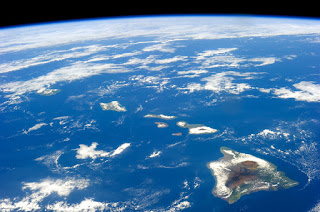 |
| We have your back, Andre—all of us. |
For those of you unfamiliar with a visit to the Hawaiian islands, there's a peculiar phenomenon associated with a traveler's arrival and departure to America's island paradise. It's a long flight each way. The flight to the islands is usually filled with giddy excitement, so it's not that big of a deal, except that you usually get in late in the afternoon or early in the evening, so you essentially lose a day. The return flight generally leaves late in the evening—usually around 10 p.m. Hawaii time or so. It's understood that most people will simply sleep during the bulk of the flight and awake uncomfortably at sunrise just in time for a dairy-rich breakfast and a landing at an airport on the mainland somewhere in the Western United States. As the seasoned lesbians on Cap'n Andy's boat so astutely stated, "if you go to Hawaii for a week, you essentially lose two days."
 |
| Wailua Falls is more beautiful than this photo would indicate. |
This meant we gained an entire day back. Because the heavy rains a couple of days earlier had driven us away from the island waterfalls, we decided to visit them on this sunny day. Our morning started with a visit to the falls. Taxi cabs loaded with excited travelers lined the roads. Their passengers paraded to the edge of the lookout for the compulsory waterfall photo. A man on a motorcycle with no front teeth rode to the lookout. A dirty dog peered out of the man's jacket. As the motorcycle man set up an offering of woven bowls on the wall of the overlook, the dog wandered through the parking lot scratching himself manically. We captured our Kodak Moment in front of Wailua Falls and began exiting the parking lot. We kept a sharp eye out for the wandering dog, who roamed behind vehicles while his owner showed no concern for the canine's well being whatsoever.
 |
| The Russian Fort is a pile of rubble, its history is summed up in a few fading panels nearby. |
On our way to Waimea, we stopped at the old Russian Fort that survived for a short period of time on Kauai before the Russians were kicked out by the natives. The star-shaped fort was mostly just a shapeless pile of rubble. The interpretive posters were sparse on information. They didn't answer the obvious question: What did the Russians do that pissed of the islanders so much that the Cossacks were banished and their fort destroyed? We never found the answer.
 |
| A sculpture at Koloa illustrates the cultures that led to the success of the Sugar Cane Industry on Kauai. |
The clouds began rolling in as we began our dizzying ascent toward the Waimea Canyon overlook. In just two short miles we were already 2,000 feet above the beaches. We captured a quick glimpse of the edge of the canyon. Someone had pasted an homage to Andre the Giant on a guardrail post where we stopped. Hopefully the Hawaiian Culture has a posse as active as Andre the Giant's, and the culture will be remembered long after the islands have been successfully pillaged for economic gains by the Corporate P.T. Barnums of Modern Day. Larry Ellison has purchased an entire island off of Maui that he plans to develop into a luxury playground for the Super Rich, according to one of the island locals we met. Ground-floor rooms without a beach view are rumored to start at $1,000 a night—an order of magnitude higher in price than the current beach-view rooms at the resorts on Kauai.
 |
| The Waimea Canyon area from a lookout well below the canyon lookout. |
What this means for the future, I can't say, though the concept of purchasing an island and giving its inhabitants the choice to leave or become "employees" of the plantation master seems repulsive in this day and age. I guess it depends on your perspective. But apparently, Ellison and others out there are longing to leave their modern stamps on the world, like the figures pecked into the lava rock by ancient Polynesians.
Waimea Canyon was socked in by dense fog. We didn't get to see its full splendor, but the miasma gives us an excuse to return some day. Back at the condominium, we enjoyed a cool shower, and we polished off the last of the rum in some fine home-made guava coladas. We ate beans and rice as our final meal on the island, despite knowing that the meal's after effects would be unpleasant to us and others trapped in the confined quarters of an airplane.
Like a good traveler, I slept most of the way back. Caroline was not so fortunate; she enjoyed only a few minutes of distracted sleep. The heavy breakfast of milk and milk products was disagreeable, but we ate it anyway. In Phoenix, the flight crew was distracted. Our landing in Albuquerque was smooth. The icy air on our skin was a shocking but welcome contrast to the warm days we had experienced on the island.
 |
| Our view from the lanai at sunset during our last day on Kauai. |
Our vacation this year gave us a valuable perspective and and appreciation for all facets of our lives. And in that sense, it was the best vacation we've ever had.
See you on down the road.






















